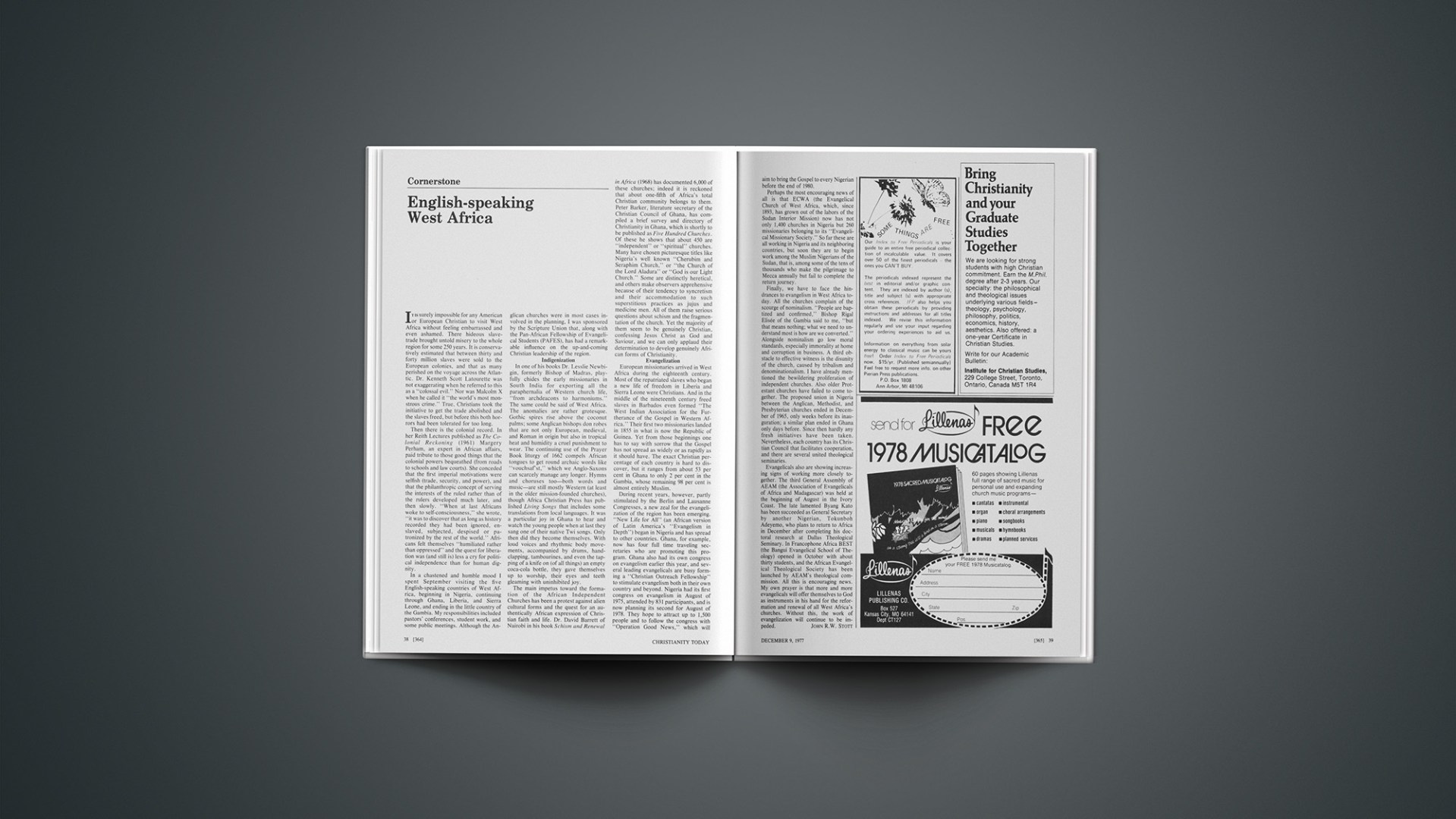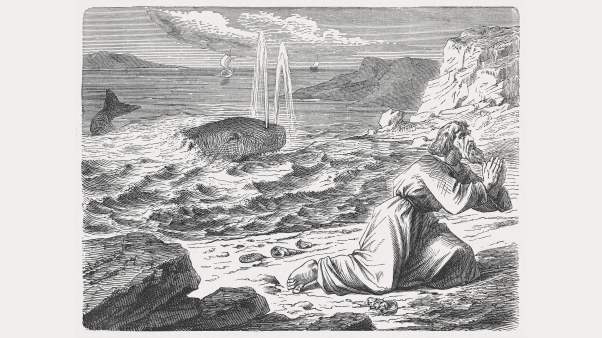It is surely impossible for any American or European Christian to visit West Africa without feeling embarrassed and even ashamed. There hideous slave-trade brought untold misery to the whole region for some 250 years. It is conservatively estimated that between thirty and forty million slaves were sold to the European colonies, and that as many perished on the voyage across the Atlantic. Dr. Kenneth Scott Latourette was not exaggerating when he referred to this as a “colossal evil.” Nor was Malcolm X when he called it “the world’s most monstrous crime.” True, Christians took the initiative to get the trade abolished and the slaves freed, but before this both horrors had been tolerated for too long.
Then there is the colonial record. In her Reith Lectures published as The Colonial Reckoning (1961) Margery Perham, an expert in African affairs, paid tribute to those good things that the colonial powers bequeathed (from roads to schools and law courts). She conceded that the first imperial motivations were selfish (trade, security, and power), and that the philanthropic concept of serving the interests of the ruled rather than of the rulers developed much later, and then slowly. “When at last Africans woke to self-consciousness,” she wrote, “it was to discover that as long as history recorded they had been ignored, enslaved, subjected, despised or patronized by the rest of the world.” Africans felt themselves “humiliated rather than oppressed” and the quest for liberation was (and still is) less a cry for political independence than for human dignity.
In a chastened and humble mood I spent September visiting the five English-speaking countries of West Africa, beginning in Nigeria, continuing through Ghana, Liberia, and Sierra Leone, and ending in the little country of the Gambia. My responsibilities included pastors’ conferences, student work, and some public meetings. Although the Anglican churches were in most cases involved in the planning, I was sponsored by the Scripture Union that, along with the Pan-African Fellowship of Evangelical Students (PAFES), has had a remarkable influence on the up-and-coming Christian leadership of the region.
Indigenization
In one of his books Dr. Lesslie Newbigin, formerly Bishop of Madras, playfully chides the early missionaries in South India for exporting all the paraphernalia of Western church life, “from archdeacons to harmoniums.” The same could be said of West Africa. The anomalies are rather grotesque. Gothic spires rise above the coconut palms; some Anglican bishops don robes that are not only European, medieval, and Roman in origin but also in tropical heat and humidity a cruel punishment to wear. The continuing use of the Prayer Book liturgy of 1662 compels African tongues to get round archaic words like “vouchsaf’ st,” which we Anglo-Saxons can scarcely manage any longer. Hymns and choruses too—both words and music—are still mostly Western (at least in the older mission-founded churches), though Africa Christian Press has published Living Songs that includes some translations from local languages. It was a particular joy in Ghana to hear and watch the young people when at last they sang one of their native Twi songs. Only then did they become themselves. With loud voices and rhythmic body movements, accompanied by drums, handclapping, tambourines, and even the tapping of a knife on (of all things) an empty coca-cola bottle, they gave themselves up to worship, their eyes and teeth gleaming with uninhibited joy.
The main impetus toward the formation of the African Independent Churches has been a protest against alien cultural forms and the quest for an authentically African expression of Christian faith and life. Dr. David Barrett of Nairobi in his book Schism and Renewal in Africa (1968) has documented 6,000 of these churches; indeed it is reckoned that about one-fifth of Africa’s total Christian community belongs to them. Peter Barker, literature secretary of the Christian Council of Ghana, has compiled a brief survey and directory of Christianity in Ghana, which is shortly to be published as Five Hundred Churches. Of these he shows that about 450 are “independent” or “spiritual” churches. Many have chosen picturesque titles like Nigeria’s well known “Cherubim and Seraphim Church,” or “the Church of the Lord Aladura” or “God is our Light Church.” Some are distinctly heretical, and others make observers apprehensive because of their tendency to syncretism and their accommodation to such superstitious practices as jujus and medicine men. All of them raise serious questions about schism and the fragmentation of the church. Yet the majority of them seem to be genuinely Christian, confessing Jesus Christ as God and Saviour, and we can only applaud their determination to develop genuinely African forms of Christianity.
Evangelization
European missionaries arrived in West Africa during the eighteenth century. Most of the repatriated slaves who began a new life of freedom in Liberia and Sierra Leone were Christians. And in the middle of the nineteenth century freed slaves in Barbados even formed “The West Indian Association for the Furtherance of the Gospel in Western Africa.” Their first two missionaries landed in 1855 in what is now the Republic of Guinea. Yet from those beginnings one has to say with sorrow that the Gospel has not spread as widely or as rapidly as it should have. The exact Christian percentage of each country is hard to discover, but it ranges from about 53 per cent in Ghana to only 2 per cent in the Gambia, whose remaining 98 per cent is almost entirely Muslim.
During recent years, however, partly stimulated by the Berlin and Lausanne Congresses, a new zeal for the evangelization of the region has been emerging. “New Life for All” (an African version of Latin America’s “Evangelism in Depth”) began in Nigeria and has spread to other countries. Ghana, for example, now has four full time traveling secretaries who are promoting this program. Ghana also had its own congress on evangelism earlier this year, and several leading evangelicals are busy forming a “Christian Outreach Fellowship” to stimulate evangelism both in their own country and beyond. Nigeria had its first congress on evangelism in August of 1975, attended by 831 participants, and is now planning its second for August of 1978. They hope to attract up to 1,500 people and to follow the congress with “Operation Good News,” which will aim to bring the Gospel to every Nigerian before the end of 1980.
Perhaps the most encouraging news of all is that ECWA (the Evangelical Church of West Africa, which, since 1893, has grown out of the labors of the Sudan Interior Mission) now has not only 1,400 churches in Nigeria but 260 missionaries belonging to its “Evangelical Missionary Society.” So far these are all working in Nigeria and its neighboring countries, but soon they are to begin work among the Muslim Nigerians of the Sudan, that is, among some of the tens of thousands who make the pilgrimage to Mecca annually but fail to complete the return journey.
Finally, we have to face the hindrances to evangelism in West Africa today. All the churches complain of the scourge of nominalism. “People are baptized and confirmed,” Bishop Rigal Elisée of the Gambia said to me, “but that means nothing; what we need to understand most is how are we converted.” Alongside nominalism go low moral standards, especially immorality at home and corruption in business. A third obstacle to effective witness is the disunity of the church, caused by tribalism and denominationalism. I have already mentioned the bewildering proliferation of independent churches. Also older Protestant churches have failed to come together. The proposed union in Nigeria between the Anglican, Methodist, and Presbyterian churches ended in December of 1965, only weeks before its inauguration; a similar plan ended in Ghana only days before. Since then hardly any fresh initiatives have been taken. Nevertheless, each country has its Christian Council that facilitates cooperation, and there are several united theological seminaries.
Evangelicals also are showing increasing signs of working more closely together. The third General Assembly of AEAM (the Association of Evangelicals of Africa and Madagascar) was held at the beginning of August in the Ivory Coast. The late lamented Byang Kato has been succeeded as General Secretary by another Nigerian, Tokunboh Adeyemo, who plans to return to Africa in December after completing his doctoral research at Dallas Theological Seminary. In Francophone Africa BEST (the Bangui Evangelical School of Theology) opened in October with about thirty students, and the African Evangelical Theological Society has been launched by AEAM’s theological commission. All this is encouraging news. My own prayer is that more and more evangelicals will offer themselves to God as instruments in his hand for the reformation and renewal of all West Africa’s churches. Without this, the work of evangelization will continue to be impeded.
JOHN R.W. STOTT










